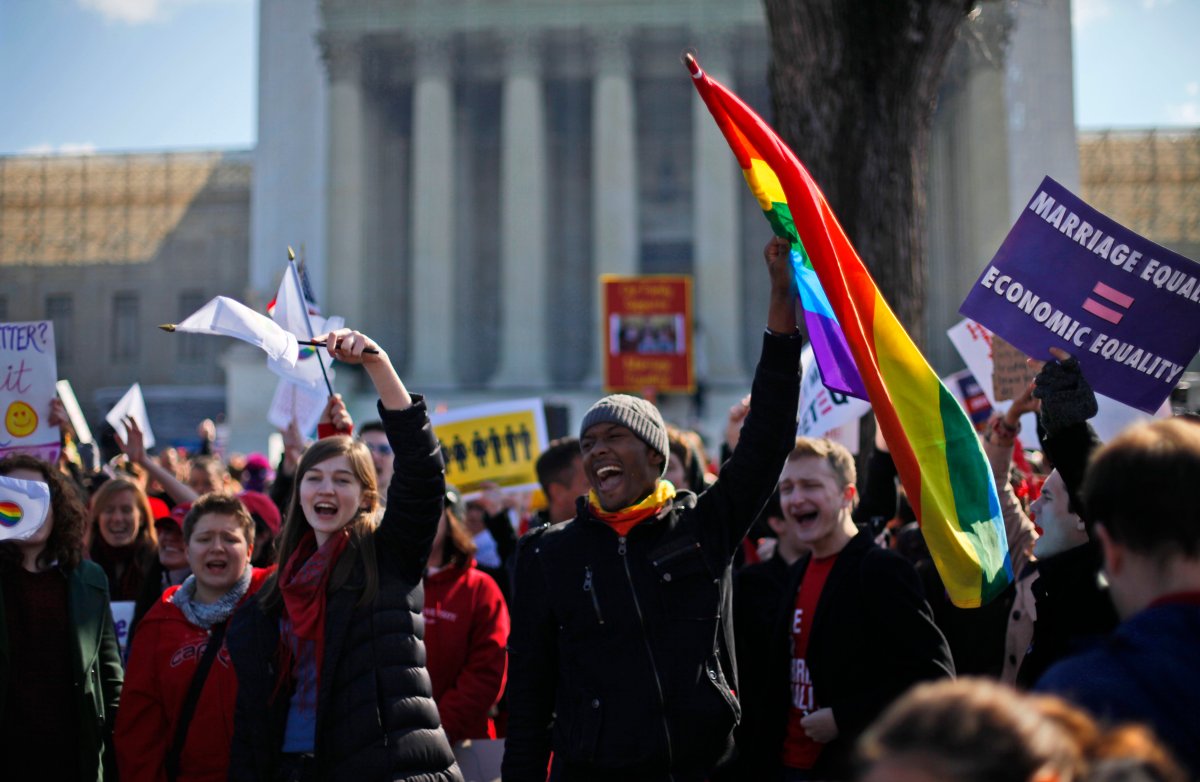WASHINGTON – All eyes were on the U.S. Supreme Court on Tuesday as it began hearing arguments on two same-sex marriage cases with far-reaching implications for gay civil rights amid a national debate that seems antiquated compared to the progress made in other western nations.

Hundreds of people, both for and against same-sex matrimony, amassed outside the iconic Supreme Court building. Inside, the nine-justice panel posed questions to lawyers that observers quickly parsed for clues to how the judges might be leaning in the gay marriage debate.
“It’s a great day to be on the right side of history,” Natasha Roit, a California attorney, said outside the courthouse alongside her wife.
“America is way behind other industrialized nations in terms of gay rights. It’s about time we turned the page.”
While countries like Canada and Australia have recognized same-sex marriage for years, the queries from the American justices suggested some reluctance to move ahead in declaring same-sex marriage a federal right in the United States.
Some of them challenged arguments that California’s ban on gay marriage, known as Proposition 8, is unconstitutional.
The Supreme Court panel is made up of five Republican appointees and four Democrats, two of whom were appointed by U.S. President Barack Obama in his first term.
“When did it become unconstitutional to exclude homosexuals from marriage?” Justice Antonin Scalia, one of the court’s most conservative justices, asked Ted Olson, a lawyer seeking to overturn Prop 8.
Olson pointed to the 1967 Supreme Court ruling that overturned state laws outlawing interracial marriage.
Conservative Justice Anthony Kennedy, whose vote in June will likely be pivotal given he’s a libertarian who’s written previous judgments upholding gay rights, said the court was in “uncharted waters” and wondered whether it should be hearing the case at all.
Others suggested the Supreme Court shouldn’t move too fast on same-sex marriage.
“You want us to step in and assess the effects of this institution, which is newer than cellphones and/or the Internet?” Justice Samuel Alito asked one of the lawyers.
But two of the liberal justices on the panel questioned one of the key arguments against same-sex marriage – that the federal government has a societal duty to protect traditional marriage for “responsible procreation.”
Justice Elena Kagan pointed out that heterosexual couples older than 55 are permitted to wed. “Not a lot of children” result from such marriages, she said.
Justice Ruth Bader Ginsburg added heterosexual couples in prison are also allowed to wed.
“No possibility of children there,” she said.
On Wednesday, the court hears arguments on another same-sex marriage case when it weighs the federal Defence of Marriage Act, legislation that denies federal benefits to spouses in gay marriages and prevents the federal government from recognizing same-sex unions in states where they are legal.
Lawyers both for and against Prop 8 said outside the courthouse that they didn’t feel the justices gave any clear indication of how they might rule in June given both sides were thoroughly grilled.
But Olson added that the tide was turning for same-sex marriage in America, given the majority of citizens are now in favour of it.
“We are confident of where the American people are going with this,” he said on the steps of the court building.
The latest polls suggest that as many as 58 per cent of Americans now support same-sex marriage, compared with just 13 per cent 25 years ago.
And pollsters are discovering it’s not just a generation gap that explains the dramatic shift – even older Americans are changing their minds about gay marriage, as are citizens in rural areas, from religious backgrounds and in traditionally conservative jurisdictions.
The issue, indeed, is being increasingly viewed as a civil rights battle.
The White House has been closely watching the Supreme Court arguments.
U.S. President Barack Obama became the first commander-in-chief in American history to back gay marriage when he reversed his stance on the issue last year. The White House is urging the high court to rule in favour of same-sex rights.
Valerie Jarrett, one of Obama’s top advisers, and two White House lawyers were at the court on Tuesday to hear the arguments.
Obama received updates on those arguments, White House press secretary Jay Carney told Tuesday’s daily news briefing. He refused to speculate on how the Supreme Court might ultimately rule.
“I think we’ve seen in recent history that there’s ample reason to be cautious about predicting outcomes in Supreme Court cases based on any particular piece of the puzzle – in this case, oral arguments,” he said.
“So I’ll heed my own caution and not engage in that.”



Comments